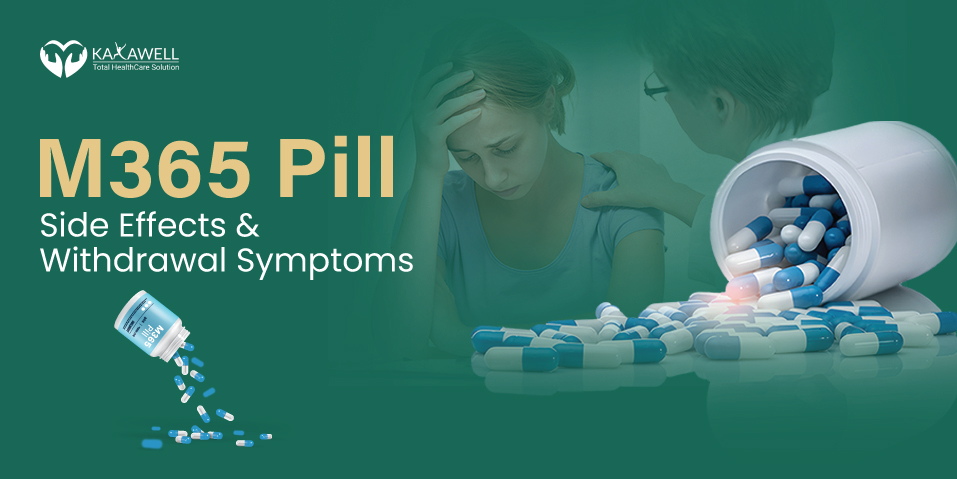The Untold Truth About M365 Pill: Side Effects & Withdrawal Symptoms
The M365 pill is a powerful knee pain reliever that combines hydrocodone and acetaminophen. While acetaminophen can be purchased without a prescription for pain relief, hydrocodone is a strong opioid that requires a prescription due to its potency and potential adverse effects.
Some other brands like LORTAB and Vicodin have been discontinued. M365 pills have been making waves, but what do we need to know about their side effects and withdrawal symptoms? This understanding can assist you in making well-informed decisions.
What Is M365?
M365 pills are often used for various health reasons. They can help improve mood, focus, or even weight loss. But just like anything else that promises benefits, there can be downsides. As well as M365 pill is generally used as a pain reliever and also comes with a Medication Guide and patient information leaflet.
Common Side Effects of M365
When you take M365, you might feel a boost initially, but You may experience nausea, vomiting, constipation, lightheadedness, dizziness, or drowsiness. Some of these side effects might diminish as you continue using this medication. If any of these symptoms persist or worsen, inform your doctor or pharmacist right away side effects can follow. Here’s what you might experience:
1. Nausea and Upset Stomach
Have you ever taken a pill, hoping for relief, only to end up feeling queasy? One of the most frequent grievances is this. Your stomach might feel like it’s doing somersaults after you take it.
2. Sleep Issues
It’s like drinking too much coffee before bed. M365 may keep you buzzing when you want to wind down, leading to sleep disorders like insomnia or restless nights, which can get frustrating fast.
3. Anxiety and Jitters
Some users find their heart racing or anxious, almost like they’ve had too many energy drinks. This can be a major downside for people looking for calm.
4. Changes in Appetite
For some, M365 might make food less appealing. Have you ever skipped meals because you just weren’t hungry? Users report this as the type of change occurring.
5. Headaches
A pounding headache can be a real mood-buster. Many people taking M365 experience headaches that come and go, making it harder to find effective migraine relief and adding to the frustration.
Understanding Withdrawal Symptoms
After developing a dependency and building tolerance, it is still possible to achieve sobriety. Certain medical professionals suggest gradually reducing M365 intake to avoid facing the unpleasant withdrawal symptoms that occur when discontinuing its use. Let’s look at what you might face:
1. Fatigue
Ceasing M365 might give you the sensation of reaching a barrier. Extreme tiredness can set in, as your body adjusts to life without the pill.
2. Mood Swings
Imagine a rollercoaster ride of emotions; that’s what some experience. One minute you’re fine, and the next you feel down. The process of adjustment involves all of this and is completely normal.
3. Cravings
Feeling a strong pull to take the pill again? That’s not unusual. Cravings can be powerful, making it hard to stay the course.
4. Return of Previous Symptoms
If you were using M365 to manage certain symptoms, they might come back with a vengeance. This can be disheartening, especially if you felt improvements while on the pill.
5. Difficulty Concentrating
Ever tried to focus when your mind feels clouded? That’s what many face after discontinuing M365. It can be tough to hone in on tasks or make decisions without the assist from the pill.
Warnings for Use of Drugs and Alcohol
It is important to avoid taking the M365 pill along with drugs or alcohol as it can lead to serious physical and mental effects. Alcohol can elevate the levels of this medication in the system, increasing the risk of an overdose. Combining alcohol with this drug can result in seizures, severe psychological symptoms, and potential brain damage due to reduced oxygen levels caused by slowed breathing and/or heart rate.
Frequent use of the M365 pill increases the risk of dependency. Therefore, doctors should closely monitor a patient’s usage and response to this medication. The impact of hydrocodone on the nervous system can be fatal in the case of an overdose, and excessive acetaminophen can damage the liver. It is crucial for patients to adhere to the prescribed dosage.
Concluding Thoughts
Before starting this medication, notify your doctor or pharmacist if you have any allergies to it, other opioids (such as benzhydrocodone, hydromorphone, morphine, codeine), or any other allergens. This product might contain inactive elements that could trigger allergic reactions or other complications. Seek more information from healthcare experts or your pharmacist.
When pregnant, only use this medication if necessary, as it could harm an unborn baby. Have a conversation with healthcare experts about the pros and cons. This medication transfers into breast milk and might have negative effects on a nursing baby. Inform the doctor immediately if your baby shows signs of unusual sleepiness, difficulty feeding, or trouble breathing. Seek advice from healthcare experts before breastfeeding.
